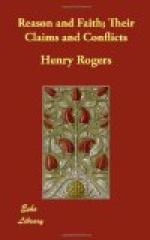But, for submitting to us many profound and insoluble problems, the second of the above reasons—the training of the intellect and heart of man to submission to the Supreme Intelligence alone be sufficient. For it; as is indicated by every thing in human nature, and by the representations of Scripture, which are in analogy with both, the present world is but the school of man in this the childhood of his being, to prepare him for the enjoyment of an immortal manhood in another, everything might be expected to be subordinated to this great end; and as the end of that education, can be no other than an enlightened obedience to God, the harmonious and concurrent exercise of reason and faith becomes absolutely necessary—not of reason to the exclusion of faith, for otherwise there would be no adequate test of man’s docility and submission; nor of a faith that would assert itself, not only independent of reason, but in contradiction to it,—which would not be what God requires, and what alone can quadrate with that intelligent nature He has impressed on His offspring—a reasonable obedience. Implicit obedience, then, to the dictates of an all-perfect wisdom, exercised amidst many difficulties and perplexities, as so many tests of sincerity, and yet sustained by evidences which justify the conclusions which involve them, would seem to be the great object of man’s moral education here; and to justify both the partial evidence addressed to his reason, and the abundant difficulties which it leaves to his faith. ‘The evidence of religion,’ says Butler, ’is fully sufficient for all the purposes of probation, how far soever it is from being satisfactory as to the purposes of curiosity, or any other: and, indeed, it answers the purposes of the former in several respects which it would not do if it were as over-bearing as is required.’* Or as Pascal beautifully puts it:—’There is light enough for those whose sincere wish is to see,—and darkness enough to confound those of an opposite disposition.’+
____
* Analogy, part 2. chap. viii. + Pensees. Faugere’s edition, tom. ii. p. 151. The views here developed will be found an expansion of some brief hints at the close of the article on Pascal’s ‘Life and Genius’ (Ed. Review, Jan. 1847), though our space then prevented us from more than touching these topics. We may add that we gladly take this opportunity of pointing the attention of our readers to a tract of Archbishop Whately’s, entitled ‘The example of children as proposed to Christians,’ which his Grace, having been struck with a coincidence between some of the thoughts in the tract and those expressed in the ‘Review,’ did us the favour to transmit to us. Had we seen the tract before, we should have been glad to illustrate and confirm our own views by those of this highly gifted prelate. We earnestly recommend the tract in question (as well as the whole of the remarkable volume in which it is now incorporated, ’Essays on some of the




